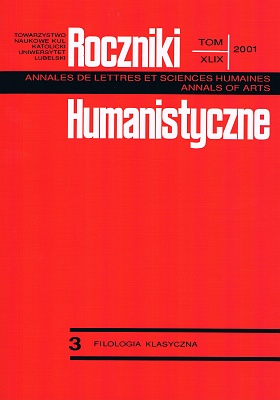Nawiązania do Marcjalisa w epigramatach Janusa Pannoniusa
Abstrakt
The various and rich output of Janus Pannonius, Hungarian poet of Renaissance, includes almost five hundred epigrams, written in splendid Latin and following traditions of poetics. The article gives several examples of Pannonius' epigrams to reveal references to Martial they contain. Janus refers to the classics in accordance with the principles of imitatio and aemulatio, due to which the work meets the requirements of Renaissance poetics without losing its own authenticity at the same time. Pannonius is not only the first known poet of his country, but also the first who implanted European culture in Hungary.
Bibliografia
Słownik łacińsko-polski. Pod red. M. Plezi. T. 1-5. Warszawa: PWN 1959-1979.
Antologia Palatyńska. Wybrał, przeł. i oprac. Z. Kubiak. Warszawa: PWN 1978.
Budzisz A.: Decorum i aemulatio – renesansowe normy naśladowania autorów starożytnych. W: Studia nad kulturą antyczną. Opole 1997.
Budzisz A.: Epigramat łaciński w Polsce w pierwszej połowie XVI w. Studium analityczne. Lublin: Towarzystwo Naukowe KUL 1988.
Otwinowska B.: Imitacja. W: Problemy literatury staropolskiej. Pod red. J. Pelca. Seria 2. Wrocław: Ossolineum 1973.
Petrarca F.: Le Familiari. Ed. critica. Vol. 1. Firenze 1933.
Sarnowska-Temeriusz E.: Zarys dziejów poetyki (Od starożytności do końca XVII w.). Warszawa: PWN 1985.
Scaligero G. C.: Poetices libri septem. [Bmw.] 1586.
Szelest H.: Marcjalis i jego twórczość. Wrocław: Ossolineum 1963.
Ślaski J.: Janus Pannonius a Polacy. W: Studia z dziejów polsko-węgierskich stosunków literackich. Pod red. I. Csaplárosa. Warszawa: Wydawnictwo Uniwersytetu Warszawskiego 1978.
Copyright (c) 2001 Roczniki Humanistyczne

Utwór dostępny jest na licencji Creative Commons Uznanie autorstwa – Użycie niekomercyjne – Bez utworów zależnych 4.0 Międzynarodowe.





